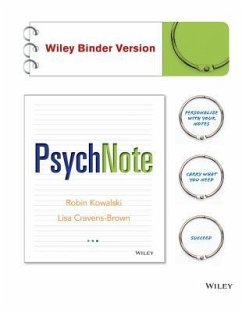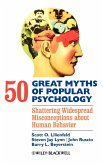- Loseblattsammlung
- Merkliste
- Auf die Merkliste
- Bewerten Bewerten
- Teilen
- Produkt teilen
- Produkterinnerung
- Produkterinnerung
PsychNote is an innovative new learning program for Intro Psych which addresses two of the most important course issues: student study skills and textbook affordability. It consists of three interlocking elements. There will be a brief (384 page), four-color, paperback "worktext." Each chapter will contain a condensed overview of important concepts (organized into modules with companion learning objectives) supported by a limited number supporting photos, charts, graphs and tables. Each chapter will also contain a section containing a concept outline designed to be taken to lecture and used…mehr
Andere Kunden interessierten sich auch für
![Lifelines Lifelines]() Sharan B MerriamLifelines50,99 €
Sharan B MerriamLifelines50,99 €![Psychology and You Psychology and You]() Julia C BerrymanPsychology and You70,99 €
Julia C BerrymanPsychology and You70,99 €![What's Wrong with Us? What's Wrong with Us?]() Colin FelthamWhat's Wrong with Us?183,99 €
Colin FelthamWhat's Wrong with Us?183,99 €![Psychology in Action Psychology in Action]() Karen HuffmanPsychology in Action174,99 €
Karen HuffmanPsychology in Action174,99 €![Psychology Around Us Psychology Around Us]() Ronald ComerPsychology Around Us171,99 €
Ronald ComerPsychology Around Us171,99 €![Applying Psychology in Everyda Applying Psychology in Everyda]() Kenneth T StrongmanApplying Psychology in Everyda77,99 €
Kenneth T StrongmanApplying Psychology in Everyda77,99 €![50 Great Myths Psychology 50 Great Myths Psychology]() Scott O Lilienfeld50 Great Myths Psychology140,99 €
Scott O Lilienfeld50 Great Myths Psychology140,99 €-
-
-
PsychNote is an innovative new learning program for Intro Psych which addresses two of the most important course issues: student study skills and textbook affordability. It consists of three interlocking elements. There will be a brief (384 page), four-color, paperback "worktext." Each chapter will contain a condensed overview of important concepts (organized into modules with companion learning objectives) supported by a limited number supporting photos, charts, graphs and tables. Each chapter will also contain a section containing a concept outline designed to be taken to lecture and used for student note-taking. This outline will provide a skeleton view of the important concepts discussed in the chapter and space for a student to write notes from the instructor's lecture.
PsychNote Binder Ready Version is an innovative new learning program for Intro to Psych which addresses two of the most important course issues: student study skills and textbook affordability. Each chapter contains a condensed overview of important concepts (organized into modules with companion learning objectives) supported by photos, charts, graphs and tables. Each chapter also includes a section containing a concept outline designed to be taken to lecture and used for student note-taking. This outline provides a skeleton view of the important concepts discussed in the chapter and space for a student to write notes from the instructor's lecture. This text is an unbound, binder-ready version.
Hinweis: Dieser Artikel kann nur an eine deutsche Lieferadresse ausgeliefert werden.
PsychNote Binder Ready Version is an innovative new learning program for Intro to Psych which addresses two of the most important course issues: student study skills and textbook affordability. Each chapter contains a condensed overview of important concepts (organized into modules with companion learning objectives) supported by photos, charts, graphs and tables. Each chapter also includes a section containing a concept outline designed to be taken to lecture and used for student note-taking. This outline provides a skeleton view of the important concepts discussed in the chapter and space for a student to write notes from the instructor's lecture. This text is an unbound, binder-ready version.
Hinweis: Dieser Artikel kann nur an eine deutsche Lieferadresse ausgeliefert werden.
Produktdetails
- Produktdetails
- Verlag: Wiley
- Seitenzahl: 464
- Erscheinungstermin: 22. Dezember 2014
- Englisch
- Abmessung: 272mm x 579mm x 15mm
- Gewicht: 885g
- ISBN-13: 9781118460092
- ISBN-10: 111846009X
- Artikelnr.: 36146700
- Herstellerkennzeichnung
- Libri GmbH
- Europaallee 1
- 36244 Bad Hersfeld
- 06621 890
- Verlag: Wiley
- Seitenzahl: 464
- Erscheinungstermin: 22. Dezember 2014
- Englisch
- Abmessung: 272mm x 579mm x 15mm
- Gewicht: 885g
- ISBN-13: 9781118460092
- ISBN-10: 111846009X
- Artikelnr.: 36146700
- Herstellerkennzeichnung
- Libri GmbH
- Europaallee 1
- 36244 Bad Hersfeld
- 06621 890
Dr. Robin Kowalski is a professor of psychology at Clemson University. She has received a host of awards including SEPA Professional Paper Award, Association of Women in Psychology (AWP)/Division 35 Research Award, SEPA/CEPO Research Award, and the Phi Beta Kappa Award. Dr. Kowalski is a a member of several organizations including the Southeastern Psychology Association, Society for Personality and Social Psychology, American Psychological Association, and the International Society for Self and Identity. Her research interests include Cyber Bullying, Aversive Interpersonal Behaviors, especially teasing and complaining, Health Psychology, and Courage. Lisa Cravens-Brown is a triple alumna of The Ohio State University, having earned her B.A., M.A., and Ph.D. in child clinical psychology. After her internship at the University of North Carolina, Chapel Hill, she returned to Columbus to work fulltime as a therapist for sex offending youth at a local community mental health center. Several years ago, she became re-involved with the University, first as a contract instructor, then as full-time teaching faculty in the Department of Psychology, where she holds a senior lecturer position. In addition to teaching several large undergraduate classes each quarter, Lisa gives multiple lectures and talks around campus and has recently taken on the role of faculty adviser to a new student sexuality discussion group.
CHAPTER 1
PSYCHOLOGY: THE STUDY OF MENTAL PROCESSES AND BEHAVIOR 1
BOUNDARIES AND BORDERS OF PSYCHOLOGY 1
Boundary with Biology 1 Boundary with Culture 2
From Philosophy to Psychology 2
PERSPECTIVES IN PSYCHOLOGY 4
Psychodynamic Perspective 4
Behaviorist Perspective 5
Cognitive Perspective 6
Evolutionary Perspective 7
Commentary: Making Sense of Psychological Perspectives 8
CHAPTER 2
RESEARCH METHODS IN PSYCHOLOGY 19
CHARACTERISTICS OF GOOD PSYCHOLOGICAL RESEARCH 19
Theoretical Framework 20
Standardized Procedures 20
Generalizability from a Sample 20
Objective Measurement 21
DESCRIPTIVE RESEARCH 22
Focus on Methodology: What to do with Descriptive Research 22
EXPERIMENTAL RESEARCH 23
Logic of Experimentation 23
Steps in Conducting an Experiment 23
Limitations of Experimental Research 25
Focus on Methodology: Testing the Hypothesis-Inferential Statistics 25
CORRELATIONAL RESEARCH 26
HOW TO EVALUATE A STUDY CRITICALLY 27
ONE STEP FURTHER: ETHICAL QUESTIONS COME IN SHADES OF GRAY 27
Deception in Psychological Research 28
Ethics and Animal Research 28
CHAPTER 3
BIOLOGICAL BASES OF MENTAL LIFE AND BEHAVIOR 41
NEURONS: BASIC UNITS OF THE NERVOUS SYSTEM 41
Anatomy of a Neuron 42
Firing of a Neuron 42
Transmission of Information between Cells 44
Peripheral Nervous System 45
Somatic Nervous System 47
Autonomic Nervous System 47
STUDYING THE BRAIN 47
CENTRAL NERVOUS SYSTEM 48
Spinal Cord 48
Hindbrain 48
Midbrain 49
Subcortical Forebrain 49
Cerebral Cortex 51
GENETICS AND EVOLUTION 54
Influence of Genetics on Psychological Functioning 54
Behavioral Genetics 54 Evolution 55
Evolution of the Central Nervous System 56
THE FUTURE: GENETIC ENGINEERING 57
CHAPTER 4
SENSATION AND PERCEPTION 72
BASIC PRINCIPLES 72
SENSING THE ENVIRONMENT 73
Transduction 73
Absolute Thresholds 73
Difference Thresholds 74
Sensory Adaptation 74
VISION 75
Nature of Light 75
Eye 75
Neural Pathways 78
Perceiving in Color 80
HEARING 81
Nature of Sound 82
Ear 82
Neural Pathways 85
OTHER SENSES 85
Smell 85
Taste 87
Skin Senses 87
Proprioceptive Senses 89
PERCEPTION 89
Organizing Sensory Experience 90
Interpreting Sensory Experience 93
CHAPTER 5
LEARNING 111
INTRODUCTION 111
CLASSICAL CONDITIONING 111
Stimulus Generalization and Discrimination 112
Extinction 112
Factors Affecting Classical Conditioning 112
What Do Organisms Learn in Classical
Conditioning? 114
OPERANT CONDITIONING 114
Reinforcement 114
Punishment 115
Extinction 117
Operant Conditioning of Complex
Behaviors 117
ONE STEP FURTHER: WHY ARE REINFORCERS REINFORCING? 120
Reinforcers as Drive Reducers 120
Primary and Secondary Reinforcers 120
Role of Feelings 120
COGNITIVE-SOCIAL THEORY 121
Learning and Cognition 121
Social Learning 122
CHAPTER 6
MEMORY 137
MEMORY AND INFORMATION PROCESSING 137
Mental Representations 137
Information Processing: An Evolving Model 138
WORKING MEMORY 140
Processing Information in Working Memory: The Central Executive 140
Visual and Verbal Storage 140
Relation between Working Memory and Long-Term Memory 141
VARIETIES OF LONG-TERM MEMORY 141
Declarative and Procedural Memory 142
Explicit and Implicit Memory 142
Everyday Memory 143
ENCODING AND ORGANIZATION OF LONG-TERM MEMORY 144
Encoding 144
Mnemonic Devices 145
Networks of Association 146
Schemas 147
REMEMBERING, MISREMEMBERING, AND FORGETTING 148
How Long is Long-Term Memory? 148
How Accurate is Long-Term Memory? 149
Why Do People Forget? 149
CHAPTER 7
THOUGHT AND LANGUAGE 160
UNITS OF THOUGHT 160
Manipulating Mental Representations 160
Concepts and Categories 161
REASONING, PROBLEM SOLVING, AND DECISION MAKING 163
Reasoning 163
Problem Solving 164
Decision Making 166
IMPLICIT AND EVERYDAY THINKING 167
How Rational Are We? 167
Implicit Cognition 168
Emotion, Motivation, and Decision Making 168
Connectionism 169
LANGUAGE 170
Language and Thought 170
Transforming Sounds and Symbols into Meaning 171
Use of Language in Everyday Life 172
CHAPTER 8
INTELLIGENCE 184
DEFINING INTELLIGENCE 184
Intelligence Is Multifaceted, Functional, and Culturally Defined 184
INTELLIGENCE TESTING 185
Binet's Scale 185
Intelligence Testing Crosses the Atlantic 186
Validity and Reliability of IQ Tests 187
APPROACHES TO INTELLIGENCE 189
Psychometric Approach 189
Information-Processing Approach 190
Theory of Multiple Intelligences 191
HEREDITY AND INTELLIGENCE 192
Individual Differences in IQ 193
Group Differences: Race and Intelligence 195
CHAPTER 9
CONSCIOUSNESS 204
NATURE OF CONSCIOUSNESS 204
Functions of Consciousness 204
Consciousness and Attention 205
PERSPECTIVES ON CONSCIOUSNESS 206
Psychodynamic Unconscious 206
Cognitive Unconscious 207
SLEEP AND DREAMING 208
Nature and Evolution of Sleep 208
Stages of Sleep 210
Three Views of Dreaming 211
ALTERED STATES OF CONSCIOUSNESS 212
Meditation 212
Hypnosis 212
Drug-Induced States of Consciousness 213
CHAPTER 10
MOTIVATION AND EMOTION 224
PERSPECTIVES ON MOTIVATION 224
Psychodynamic Perspective 224
Behaviorist Perspective 225
Cognitive Perspective 226
Evolutionary Perspective 227
Applying the Perspectives on Motivation 228
EATING 229
Homeostasis 229
What Turns Hunger On? 230
What Turns Hunger Off? 231
Obesity 231
SEXUAL MOTIVATION 232
Sexual Response Cycle 232
Sexual Orientation 233
PSYCHOSOCIAL MOTIVES 234
Needs for Relatedness 234
Achievement and Other Agency Motives 234
NATURE AND CAUSES OF HUMAN MOTIVES 235
Emotion 235
Physiological Components 235
Subjective Experience 236
Emotional Expression 236
Taxonomy of Emotions 238
Emotion Regulation 239
Perspectives on Emotion 239
CHAPTER 11
HEALTH, STRESS, AND COPING 249
HEALTH PSYCHOLOGY 249
History of Health Psychology 249
Theories of Health Behavior 250
Health-Compromising Behaviors 253
Barriers to Health Promotion 259
STRESS 262
Stress as a Psychobiological Process 262
Stress as a Transactional Process 263
Sources of Stress 263
Stress and Health 264
COPING 266
Coping Mechanisms 266
Social Support 267
FUTURE OF HEALTH PSYCHOLOGY 267
CHAPTER 12
PERSONALITY 275
PSYCHODYNAMIC THEORIES 275
Freud's Models 276
Object Relations Theories 278
Contributions and Limitations of Psychodynamic Theories 279
COGNITIVE-SOCIAL THEORIES 279
Encoding and Personal Relevance 280
Expectancies and Competences 281
Self-Regulation 281
Contributions and Limitations of Cognitive-Social Theories 281
TRAIT THEORIES 282
Eysenck's Theory 282 Five-Factor Model 283
Is Personality Consistent? 283
Contributions and Limitations of Trait Theories 285
HUMANISTIC THEORIES 285
Rogers's Person-Centered Approach 285
Existential Approaches to Personality 286
Contributions and Limitations of Humanistic Theories 287
GENETICS AND PERSONALITY 287
PERSONALITY AND CULTURE 288
Linking Personality and Culture 288
CHAPTER 13
LIFE-SPAN DEVELOPMENT 297
ISSUES IN DEVELOPMENTAL PSYCHOLOGY 297
Nature and Nurture 297
Importance of Early Experience 298
Stages or Continuous Change? 298
SOCIAL DEVELOPMENT AND ATTACHMENT 299
Attachment in Infancy 299
Individual Differences in Attachment Patterns 299
Implications of Attachment for Later Development 300
SOCIAL DEVELOPMENT ACROSS THE LIFE SPAN 301
Erikson's Theory of Psychosocial Development 301
Development from Adolescence through Old Age 303
PHYSICAL DEVELOPMENT AND ITS PSYCHOLOGICAL CONSEQUENCES 304
Prenatal Development 304
Infancy 305
Childhood and Adolescence 305
Adulthood and Aging 306
COGNITIVE DEVELOPMENT IN INFANCY, CHILDHOOD, AND ADOLESCENCE 306
Perceptual and Cognitive Development in Infancy 306
Piaget's Theory of Cognitive Development 308
Information-Processing Approach to Cognitive Development 311
Integrative Theories of Cognitive Development 311
COGNITIVE DEVELOPMENT AND CHANGE IN ADULTHOOD 312
Cognitive Changes Associated with Aging 312
Aging and "Senility" 314
LANGUAGE DEVELOPMENT 314
A Critical Period for Language Development? 314
What Infants Know about Language 315
From Babbling to Bantering 316
MORAL DEVELOPMENT 316
Role of Cognition 317
Role of Emotion 319
Nature of Development 320
CHAPTER 14
PSYCHOLOGICAL DISORDERS 330
CULTURAL CONTEXT OF PSYCHOPATHOLOGY 330
Culture and Psychopathology 330
Is Mental Illness Nothing but a Cultural Construction? 330
CONTEMPORARY APPROACHES TO PSYCHOPATHOLOGY 331
Psychodynamic Perspective 331
Cognitive-Behavioral Perspective 332
Biological Approach 332
Systems Approach 333
Evolutionary Perspective 334
DESCRIPTIVE DIAGNOSIS: DSM-5 AND PSYCHOPATHOLOGICAL SYNDROMES 334
DSM-5 334
Disorders Usually First Diagnosed in Infancy, Childhood, or Adolescence 335
Substance-Related and Addictive Disorders 336
Schizophrenia 336 Depressive Disorders 339
Anxiety Disorders 341
Obsessive-Compulsive and Related Disorders 343
Trauma- and Stressor-Related Disorders 343
Eating Disorders 344
Dissociative Disorders 345
Personality Disorders 345
CHAPTER 15
TREATMENT OF PSYCHOLOGICAL DISORDERS 361
PSYCHODYNAMIC THERAPIES 361
Therapeutic Techniques 362
Varieties of Psychodynamic Therapy 363
COGNITIVE-BEHAVIORAL THERAPIES 363
Basic Principles 364
Classical Conditioning Techniques 364
Operant Conditioning Techniques 365
Modeling and Skills Training 365
Cognitive Therapy 366
HUMANISTIC, GROUP, AND FAMILY THERAPIES 366
Humanistic Therapies 366
Group Therapies 367
Family Therapies 368
BIOLOGICAL TREATMENTS 369
Psychotropic Medications 369
Antipsychotic Medications 370
Antidepressant and Mood-Stabilizing Medications 371
Antianxiety Medications 371
Electroconvulsive Therapy and Psychosurgery 372
EVALUATING PSYCHOLOGICAL TREATMENTS 372
Pharmacotherapy 373
Psychotherapy 373
CHAPTER 16
SOCIAL COGNITION 385
SOCIAL COGNITION 385
Perceiving Other People 385
Stereotypes and Prejudice 386
Attribution 390
Biases in Social Information Processing 391
Applications 392
ATTITUDES 392
Nature of Attitudes 393
Attitudes and Behavior 394
Persuasion 395
Cognitive Dissonance 396
THE SELF 397
Self-Esteem 398
Self-Consistency 399
Self-Presentation 399
Views of the Self 400
CHAPTER 17
INTERPERSONAL PROCESSES 411
RELATIONSHIPS 411
Factors Leading to Interpersonal Attraction 411
Love 413
Dark Side of Relationships 415
ALTRUISM 415
Theories of Altruism 415
Bystander Intervention 416
AGGRESSION 418
Violence and Culture 418
Violence and Gender 418
Roots of Violence 418
SOCIAL INFLUENCE 421
Obedience 421
Conformity 422
Group Processes 422
Everyday Social Influence 424
GLOSSARY 436
REFERENCES 445
INDEX 499
PSYCHOLOGY: THE STUDY OF MENTAL PROCESSES AND BEHAVIOR 1
BOUNDARIES AND BORDERS OF PSYCHOLOGY 1
Boundary with Biology 1 Boundary with Culture 2
From Philosophy to Psychology 2
PERSPECTIVES IN PSYCHOLOGY 4
Psychodynamic Perspective 4
Behaviorist Perspective 5
Cognitive Perspective 6
Evolutionary Perspective 7
Commentary: Making Sense of Psychological Perspectives 8
CHAPTER 2
RESEARCH METHODS IN PSYCHOLOGY 19
CHARACTERISTICS OF GOOD PSYCHOLOGICAL RESEARCH 19
Theoretical Framework 20
Standardized Procedures 20
Generalizability from a Sample 20
Objective Measurement 21
DESCRIPTIVE RESEARCH 22
Focus on Methodology: What to do with Descriptive Research 22
EXPERIMENTAL RESEARCH 23
Logic of Experimentation 23
Steps in Conducting an Experiment 23
Limitations of Experimental Research 25
Focus on Methodology: Testing the Hypothesis-Inferential Statistics 25
CORRELATIONAL RESEARCH 26
HOW TO EVALUATE A STUDY CRITICALLY 27
ONE STEP FURTHER: ETHICAL QUESTIONS COME IN SHADES OF GRAY 27
Deception in Psychological Research 28
Ethics and Animal Research 28
CHAPTER 3
BIOLOGICAL BASES OF MENTAL LIFE AND BEHAVIOR 41
NEURONS: BASIC UNITS OF THE NERVOUS SYSTEM 41
Anatomy of a Neuron 42
Firing of a Neuron 42
Transmission of Information between Cells 44
Peripheral Nervous System 45
Somatic Nervous System 47
Autonomic Nervous System 47
STUDYING THE BRAIN 47
CENTRAL NERVOUS SYSTEM 48
Spinal Cord 48
Hindbrain 48
Midbrain 49
Subcortical Forebrain 49
Cerebral Cortex 51
GENETICS AND EVOLUTION 54
Influence of Genetics on Psychological Functioning 54
Behavioral Genetics 54 Evolution 55
Evolution of the Central Nervous System 56
THE FUTURE: GENETIC ENGINEERING 57
CHAPTER 4
SENSATION AND PERCEPTION 72
BASIC PRINCIPLES 72
SENSING THE ENVIRONMENT 73
Transduction 73
Absolute Thresholds 73
Difference Thresholds 74
Sensory Adaptation 74
VISION 75
Nature of Light 75
Eye 75
Neural Pathways 78
Perceiving in Color 80
HEARING 81
Nature of Sound 82
Ear 82
Neural Pathways 85
OTHER SENSES 85
Smell 85
Taste 87
Skin Senses 87
Proprioceptive Senses 89
PERCEPTION 89
Organizing Sensory Experience 90
Interpreting Sensory Experience 93
CHAPTER 5
LEARNING 111
INTRODUCTION 111
CLASSICAL CONDITIONING 111
Stimulus Generalization and Discrimination 112
Extinction 112
Factors Affecting Classical Conditioning 112
What Do Organisms Learn in Classical
Conditioning? 114
OPERANT CONDITIONING 114
Reinforcement 114
Punishment 115
Extinction 117
Operant Conditioning of Complex
Behaviors 117
ONE STEP FURTHER: WHY ARE REINFORCERS REINFORCING? 120
Reinforcers as Drive Reducers 120
Primary and Secondary Reinforcers 120
Role of Feelings 120
COGNITIVE-SOCIAL THEORY 121
Learning and Cognition 121
Social Learning 122
CHAPTER 6
MEMORY 137
MEMORY AND INFORMATION PROCESSING 137
Mental Representations 137
Information Processing: An Evolving Model 138
WORKING MEMORY 140
Processing Information in Working Memory: The Central Executive 140
Visual and Verbal Storage 140
Relation between Working Memory and Long-Term Memory 141
VARIETIES OF LONG-TERM MEMORY 141
Declarative and Procedural Memory 142
Explicit and Implicit Memory 142
Everyday Memory 143
ENCODING AND ORGANIZATION OF LONG-TERM MEMORY 144
Encoding 144
Mnemonic Devices 145
Networks of Association 146
Schemas 147
REMEMBERING, MISREMEMBERING, AND FORGETTING 148
How Long is Long-Term Memory? 148
How Accurate is Long-Term Memory? 149
Why Do People Forget? 149
CHAPTER 7
THOUGHT AND LANGUAGE 160
UNITS OF THOUGHT 160
Manipulating Mental Representations 160
Concepts and Categories 161
REASONING, PROBLEM SOLVING, AND DECISION MAKING 163
Reasoning 163
Problem Solving 164
Decision Making 166
IMPLICIT AND EVERYDAY THINKING 167
How Rational Are We? 167
Implicit Cognition 168
Emotion, Motivation, and Decision Making 168
Connectionism 169
LANGUAGE 170
Language and Thought 170
Transforming Sounds and Symbols into Meaning 171
Use of Language in Everyday Life 172
CHAPTER 8
INTELLIGENCE 184
DEFINING INTELLIGENCE 184
Intelligence Is Multifaceted, Functional, and Culturally Defined 184
INTELLIGENCE TESTING 185
Binet's Scale 185
Intelligence Testing Crosses the Atlantic 186
Validity and Reliability of IQ Tests 187
APPROACHES TO INTELLIGENCE 189
Psychometric Approach 189
Information-Processing Approach 190
Theory of Multiple Intelligences 191
HEREDITY AND INTELLIGENCE 192
Individual Differences in IQ 193
Group Differences: Race and Intelligence 195
CHAPTER 9
CONSCIOUSNESS 204
NATURE OF CONSCIOUSNESS 204
Functions of Consciousness 204
Consciousness and Attention 205
PERSPECTIVES ON CONSCIOUSNESS 206
Psychodynamic Unconscious 206
Cognitive Unconscious 207
SLEEP AND DREAMING 208
Nature and Evolution of Sleep 208
Stages of Sleep 210
Three Views of Dreaming 211
ALTERED STATES OF CONSCIOUSNESS 212
Meditation 212
Hypnosis 212
Drug-Induced States of Consciousness 213
CHAPTER 10
MOTIVATION AND EMOTION 224
PERSPECTIVES ON MOTIVATION 224
Psychodynamic Perspective 224
Behaviorist Perspective 225
Cognitive Perspective 226
Evolutionary Perspective 227
Applying the Perspectives on Motivation 228
EATING 229
Homeostasis 229
What Turns Hunger On? 230
What Turns Hunger Off? 231
Obesity 231
SEXUAL MOTIVATION 232
Sexual Response Cycle 232
Sexual Orientation 233
PSYCHOSOCIAL MOTIVES 234
Needs for Relatedness 234
Achievement and Other Agency Motives 234
NATURE AND CAUSES OF HUMAN MOTIVES 235
Emotion 235
Physiological Components 235
Subjective Experience 236
Emotional Expression 236
Taxonomy of Emotions 238
Emotion Regulation 239
Perspectives on Emotion 239
CHAPTER 11
HEALTH, STRESS, AND COPING 249
HEALTH PSYCHOLOGY 249
History of Health Psychology 249
Theories of Health Behavior 250
Health-Compromising Behaviors 253
Barriers to Health Promotion 259
STRESS 262
Stress as a Psychobiological Process 262
Stress as a Transactional Process 263
Sources of Stress 263
Stress and Health 264
COPING 266
Coping Mechanisms 266
Social Support 267
FUTURE OF HEALTH PSYCHOLOGY 267
CHAPTER 12
PERSONALITY 275
PSYCHODYNAMIC THEORIES 275
Freud's Models 276
Object Relations Theories 278
Contributions and Limitations of Psychodynamic Theories 279
COGNITIVE-SOCIAL THEORIES 279
Encoding and Personal Relevance 280
Expectancies and Competences 281
Self-Regulation 281
Contributions and Limitations of Cognitive-Social Theories 281
TRAIT THEORIES 282
Eysenck's Theory 282 Five-Factor Model 283
Is Personality Consistent? 283
Contributions and Limitations of Trait Theories 285
HUMANISTIC THEORIES 285
Rogers's Person-Centered Approach 285
Existential Approaches to Personality 286
Contributions and Limitations of Humanistic Theories 287
GENETICS AND PERSONALITY 287
PERSONALITY AND CULTURE 288
Linking Personality and Culture 288
CHAPTER 13
LIFE-SPAN DEVELOPMENT 297
ISSUES IN DEVELOPMENTAL PSYCHOLOGY 297
Nature and Nurture 297
Importance of Early Experience 298
Stages or Continuous Change? 298
SOCIAL DEVELOPMENT AND ATTACHMENT 299
Attachment in Infancy 299
Individual Differences in Attachment Patterns 299
Implications of Attachment for Later Development 300
SOCIAL DEVELOPMENT ACROSS THE LIFE SPAN 301
Erikson's Theory of Psychosocial Development 301
Development from Adolescence through Old Age 303
PHYSICAL DEVELOPMENT AND ITS PSYCHOLOGICAL CONSEQUENCES 304
Prenatal Development 304
Infancy 305
Childhood and Adolescence 305
Adulthood and Aging 306
COGNITIVE DEVELOPMENT IN INFANCY, CHILDHOOD, AND ADOLESCENCE 306
Perceptual and Cognitive Development in Infancy 306
Piaget's Theory of Cognitive Development 308
Information-Processing Approach to Cognitive Development 311
Integrative Theories of Cognitive Development 311
COGNITIVE DEVELOPMENT AND CHANGE IN ADULTHOOD 312
Cognitive Changes Associated with Aging 312
Aging and "Senility" 314
LANGUAGE DEVELOPMENT 314
A Critical Period for Language Development? 314
What Infants Know about Language 315
From Babbling to Bantering 316
MORAL DEVELOPMENT 316
Role of Cognition 317
Role of Emotion 319
Nature of Development 320
CHAPTER 14
PSYCHOLOGICAL DISORDERS 330
CULTURAL CONTEXT OF PSYCHOPATHOLOGY 330
Culture and Psychopathology 330
Is Mental Illness Nothing but a Cultural Construction? 330
CONTEMPORARY APPROACHES TO PSYCHOPATHOLOGY 331
Psychodynamic Perspective 331
Cognitive-Behavioral Perspective 332
Biological Approach 332
Systems Approach 333
Evolutionary Perspective 334
DESCRIPTIVE DIAGNOSIS: DSM-5 AND PSYCHOPATHOLOGICAL SYNDROMES 334
DSM-5 334
Disorders Usually First Diagnosed in Infancy, Childhood, or Adolescence 335
Substance-Related and Addictive Disorders 336
Schizophrenia 336 Depressive Disorders 339
Anxiety Disorders 341
Obsessive-Compulsive and Related Disorders 343
Trauma- and Stressor-Related Disorders 343
Eating Disorders 344
Dissociative Disorders 345
Personality Disorders 345
CHAPTER 15
TREATMENT OF PSYCHOLOGICAL DISORDERS 361
PSYCHODYNAMIC THERAPIES 361
Therapeutic Techniques 362
Varieties of Psychodynamic Therapy 363
COGNITIVE-BEHAVIORAL THERAPIES 363
Basic Principles 364
Classical Conditioning Techniques 364
Operant Conditioning Techniques 365
Modeling and Skills Training 365
Cognitive Therapy 366
HUMANISTIC, GROUP, AND FAMILY THERAPIES 366
Humanistic Therapies 366
Group Therapies 367
Family Therapies 368
BIOLOGICAL TREATMENTS 369
Psychotropic Medications 369
Antipsychotic Medications 370
Antidepressant and Mood-Stabilizing Medications 371
Antianxiety Medications 371
Electroconvulsive Therapy and Psychosurgery 372
EVALUATING PSYCHOLOGICAL TREATMENTS 372
Pharmacotherapy 373
Psychotherapy 373
CHAPTER 16
SOCIAL COGNITION 385
SOCIAL COGNITION 385
Perceiving Other People 385
Stereotypes and Prejudice 386
Attribution 390
Biases in Social Information Processing 391
Applications 392
ATTITUDES 392
Nature of Attitudes 393
Attitudes and Behavior 394
Persuasion 395
Cognitive Dissonance 396
THE SELF 397
Self-Esteem 398
Self-Consistency 399
Self-Presentation 399
Views of the Self 400
CHAPTER 17
INTERPERSONAL PROCESSES 411
RELATIONSHIPS 411
Factors Leading to Interpersonal Attraction 411
Love 413
Dark Side of Relationships 415
ALTRUISM 415
Theories of Altruism 415
Bystander Intervention 416
AGGRESSION 418
Violence and Culture 418
Violence and Gender 418
Roots of Violence 418
SOCIAL INFLUENCE 421
Obedience 421
Conformity 422
Group Processes 422
Everyday Social Influence 424
GLOSSARY 436
REFERENCES 445
INDEX 499
CHAPTER 1
PSYCHOLOGY: THE STUDY OF MENTAL PROCESSES AND BEHAVIOR 1
BOUNDARIES AND BORDERS OF PSYCHOLOGY 1
Boundary with Biology 1 Boundary with Culture 2
From Philosophy to Psychology 2
PERSPECTIVES IN PSYCHOLOGY 4
Psychodynamic Perspective 4
Behaviorist Perspective 5
Cognitive Perspective 6
Evolutionary Perspective 7
Commentary: Making Sense of Psychological Perspectives 8
CHAPTER 2
RESEARCH METHODS IN PSYCHOLOGY 19
CHARACTERISTICS OF GOOD PSYCHOLOGICAL RESEARCH 19
Theoretical Framework 20
Standardized Procedures 20
Generalizability from a Sample 20
Objective Measurement 21
DESCRIPTIVE RESEARCH 22
Focus on Methodology: What to do with Descriptive Research 22
EXPERIMENTAL RESEARCH 23
Logic of Experimentation 23
Steps in Conducting an Experiment 23
Limitations of Experimental Research 25
Focus on Methodology: Testing the Hypothesis-Inferential Statistics 25
CORRELATIONAL RESEARCH 26
HOW TO EVALUATE A STUDY CRITICALLY 27
ONE STEP FURTHER: ETHICAL QUESTIONS COME IN SHADES OF GRAY 27
Deception in Psychological Research 28
Ethics and Animal Research 28
CHAPTER 3
BIOLOGICAL BASES OF MENTAL LIFE AND BEHAVIOR 41
NEURONS: BASIC UNITS OF THE NERVOUS SYSTEM 41
Anatomy of a Neuron 42
Firing of a Neuron 42
Transmission of Information between Cells 44
Peripheral Nervous System 45
Somatic Nervous System 47
Autonomic Nervous System 47
STUDYING THE BRAIN 47
CENTRAL NERVOUS SYSTEM 48
Spinal Cord 48
Hindbrain 48
Midbrain 49
Subcortical Forebrain 49
Cerebral Cortex 51
GENETICS AND EVOLUTION 54
Influence of Genetics on Psychological Functioning 54
Behavioral Genetics 54 Evolution 55
Evolution of the Central Nervous System 56
THE FUTURE: GENETIC ENGINEERING 57
CHAPTER 4
SENSATION AND PERCEPTION 72
BASIC PRINCIPLES 72
SENSING THE ENVIRONMENT 73
Transduction 73
Absolute Thresholds 73
Difference Thresholds 74
Sensory Adaptation 74
VISION 75
Nature of Light 75
Eye 75
Neural Pathways 78
Perceiving in Color 80
HEARING 81
Nature of Sound 82
Ear 82
Neural Pathways 85
OTHER SENSES 85
Smell 85
Taste 87
Skin Senses 87
Proprioceptive Senses 89
PERCEPTION 89
Organizing Sensory Experience 90
Interpreting Sensory Experience 93
CHAPTER 5
LEARNING 111
INTRODUCTION 111
CLASSICAL CONDITIONING 111
Stimulus Generalization and Discrimination 112
Extinction 112
Factors Affecting Classical Conditioning 112
What Do Organisms Learn in Classical
Conditioning? 114
OPERANT CONDITIONING 114
Reinforcement 114
Punishment 115
Extinction 117
Operant Conditioning of Complex
Behaviors 117
ONE STEP FURTHER: WHY ARE REINFORCERS REINFORCING? 120
Reinforcers as Drive Reducers 120
Primary and Secondary Reinforcers 120
Role of Feelings 120
COGNITIVE-SOCIAL THEORY 121
Learning and Cognition 121
Social Learning 122
CHAPTER 6
MEMORY 137
MEMORY AND INFORMATION PROCESSING 137
Mental Representations 137
Information Processing: An Evolving Model 138
WORKING MEMORY 140
Processing Information in Working Memory: The Central Executive 140
Visual and Verbal Storage 140
Relation between Working Memory and Long-Term Memory 141
VARIETIES OF LONG-TERM MEMORY 141
Declarative and Procedural Memory 142
Explicit and Implicit Memory 142
Everyday Memory 143
ENCODING AND ORGANIZATION OF LONG-TERM MEMORY 144
Encoding 144
Mnemonic Devices 145
Networks of Association 146
Schemas 147
REMEMBERING, MISREMEMBERING, AND FORGETTING 148
How Long is Long-Term Memory? 148
How Accurate is Long-Term Memory? 149
Why Do People Forget? 149
CHAPTER 7
THOUGHT AND LANGUAGE 160
UNITS OF THOUGHT 160
Manipulating Mental Representations 160
Concepts and Categories 161
REASONING, PROBLEM SOLVING, AND DECISION MAKING 163
Reasoning 163
Problem Solving 164
Decision Making 166
IMPLICIT AND EVERYDAY THINKING 167
How Rational Are We? 167
Implicit Cognition 168
Emotion, Motivation, and Decision Making 168
Connectionism 169
LANGUAGE 170
Language and Thought 170
Transforming Sounds and Symbols into Meaning 171
Use of Language in Everyday Life 172
CHAPTER 8
INTELLIGENCE 184
DEFINING INTELLIGENCE 184
Intelligence Is Multifaceted, Functional, and Culturally Defined 184
INTELLIGENCE TESTING 185
Binet's Scale 185
Intelligence Testing Crosses the Atlantic 186
Validity and Reliability of IQ Tests 187
APPROACHES TO INTELLIGENCE 189
Psychometric Approach 189
Information-Processing Approach 190
Theory of Multiple Intelligences 191
HEREDITY AND INTELLIGENCE 192
Individual Differences in IQ 193
Group Differences: Race and Intelligence 195
CHAPTER 9
CONSCIOUSNESS 204
NATURE OF CONSCIOUSNESS 204
Functions of Consciousness 204
Consciousness and Attention 205
PERSPECTIVES ON CONSCIOUSNESS 206
Psychodynamic Unconscious 206
Cognitive Unconscious 207
SLEEP AND DREAMING 208
Nature and Evolution of Sleep 208
Stages of Sleep 210
Three Views of Dreaming 211
ALTERED STATES OF CONSCIOUSNESS 212
Meditation 212
Hypnosis 212
Drug-Induced States of Consciousness 213
CHAPTER 10
MOTIVATION AND EMOTION 224
PERSPECTIVES ON MOTIVATION 224
Psychodynamic Perspective 224
Behaviorist Perspective 225
Cognitive Perspective 226
Evolutionary Perspective 227
Applying the Perspectives on Motivation 228
EATING 229
Homeostasis 229
What Turns Hunger On? 230
What Turns Hunger Off? 231
Obesity 231
SEXUAL MOTIVATION 232
Sexual Response Cycle 232
Sexual Orientation 233
PSYCHOSOCIAL MOTIVES 234
Needs for Relatedness 234
Achievement and Other Agency Motives 234
NATURE AND CAUSES OF HUMAN MOTIVES 235
Emotion 235
Physiological Components 235
Subjective Experience 236
Emotional Expression 236
Taxonomy of Emotions 238
Emotion Regulation 239
Perspectives on Emotion 239
CHAPTER 11
HEALTH, STRESS, AND COPING 249
HEALTH PSYCHOLOGY 249
History of Health Psychology 249
Theories of Health Behavior 250
Health-Compromising Behaviors 253
Barriers to Health Promotion 259
STRESS 262
Stress as a Psychobiological Process 262
Stress as a Transactional Process 263
Sources of Stress 263
Stress and Health 264
COPING 266
Coping Mechanisms 266
Social Support 267
FUTURE OF HEALTH PSYCHOLOGY 267
CHAPTER 12
PERSONALITY 275
PSYCHODYNAMIC THEORIES 275
Freud's Models 276
Object Relations Theories 278
Contributions and Limitations of Psychodynamic Theories 279
COGNITIVE-SOCIAL THEORIES 279
Encoding and Personal Relevance 280
Expectancies and Competences 281
Self-Regulation 281
Contributions and Limitations of Cognitive-Social Theories 281
TRAIT THEORIES 282
Eysenck's Theory 282 Five-Factor Model 283
Is Personality Consistent? 283
Contributions and Limitations of Trait Theories 285
HUMANISTIC THEORIES 285
Rogers's Person-Centered Approach 285
Existential Approaches to Personality 286
Contributions and Limitations of Humanistic Theories 287
GENETICS AND PERSONALITY 287
PERSONALITY AND CULTURE 288
Linking Personality and Culture 288
CHAPTER 13
LIFE-SPAN DEVELOPMENT 297
ISSUES IN DEVELOPMENTAL PSYCHOLOGY 297
Nature and Nurture 297
Importance of Early Experience 298
Stages or Continuous Change? 298
SOCIAL DEVELOPMENT AND ATTACHMENT 299
Attachment in Infancy 299
Individual Differences in Attachment Patterns 299
Implications of Attachment for Later Development 300
SOCIAL DEVELOPMENT ACROSS THE LIFE SPAN 301
Erikson's Theory of Psychosocial Development 301
Development from Adolescence through Old Age 303
PHYSICAL DEVELOPMENT AND ITS PSYCHOLOGICAL CONSEQUENCES 304
Prenatal Development 304
Infancy 305
Childhood and Adolescence 305
Adulthood and Aging 306
COGNITIVE DEVELOPMENT IN INFANCY, CHILDHOOD, AND ADOLESCENCE 306
Perceptual and Cognitive Development in Infancy 306
Piaget's Theory of Cognitive Development 308
Information-Processing Approach to Cognitive Development 311
Integrative Theories of Cognitive Development 311
COGNITIVE DEVELOPMENT AND CHANGE IN ADULTHOOD 312
Cognitive Changes Associated with Aging 312
Aging and "Senility" 314
LANGUAGE DEVELOPMENT 314
A Critical Period for Language Development? 314
What Infants Know about Language 315
From Babbling to Bantering 316
MORAL DEVELOPMENT 316
Role of Cognition 317
Role of Emotion 319
Nature of Development 320
CHAPTER 14
PSYCHOLOGICAL DISORDERS 330
CULTURAL CONTEXT OF PSYCHOPATHOLOGY 330
Culture and Psychopathology 330
Is Mental Illness Nothing but a Cultural Construction? 330
CONTEMPORARY APPROACHES TO PSYCHOPATHOLOGY 331
Psychodynamic Perspective 331
Cognitive-Behavioral Perspective 332
Biological Approach 332
Systems Approach 333
Evolutionary Perspective 334
DESCRIPTIVE DIAGNOSIS: DSM-5 AND PSYCHOPATHOLOGICAL SYNDROMES 334
DSM-5 334
Disorders Usually First Diagnosed in Infancy, Childhood, or Adolescence 335
Substance-Related and Addictive Disorders 336
Schizophrenia 336 Depressive Disorders 339
Anxiety Disorders 341
Obsessive-Compulsive and Related Disorders 343
Trauma- and Stressor-Related Disorders 343
Eating Disorders 344
Dissociative Disorders 345
Personality Disorders 345
CHAPTER 15
TREATMENT OF PSYCHOLOGICAL DISORDERS 361
PSYCHODYNAMIC THERAPIES 361
Therapeutic Techniques 362
Varieties of Psychodynamic Therapy 363
COGNITIVE-BEHAVIORAL THERAPIES 363
Basic Principles 364
Classical Conditioning Techniques 364
Operant Conditioning Techniques 365
Modeling and Skills Training 365
Cognitive Therapy 366
HUMANISTIC, GROUP, AND FAMILY THERAPIES 366
Humanistic Therapies 366
Group Therapies 367
Family Therapies 368
BIOLOGICAL TREATMENTS 369
Psychotropic Medications 369
Antipsychotic Medications 370
Antidepressant and Mood-Stabilizing Medications 371
Antianxiety Medications 371
Electroconvulsive Therapy and Psychosurgery 372
EVALUATING PSYCHOLOGICAL TREATMENTS 372
Pharmacotherapy 373
Psychotherapy 373
CHAPTER 16
SOCIAL COGNITION 385
SOCIAL COGNITION 385
Perceiving Other People 385
Stereotypes and Prejudice 386
Attribution 390
Biases in Social Information Processing 391
Applications 392
ATTITUDES 392
Nature of Attitudes 393
Attitudes and Behavior 394
Persuasion 395
Cognitive Dissonance 396
THE SELF 397
Self-Esteem 398
Self-Consistency 399
Self-Presentation 399
Views of the Self 400
CHAPTER 17
INTERPERSONAL PROCESSES 411
RELATIONSHIPS 411
Factors Leading to Interpersonal Attraction 411
Love 413
Dark Side of Relationships 415
ALTRUISM 415
Theories of Altruism 415
Bystander Intervention 416
AGGRESSION 418
Violence and Culture 418
Violence and Gender 418
Roots of Violence 418
SOCIAL INFLUENCE 421
Obedience 421
Conformity 422
Group Processes 422
Everyday Social Influence 424
GLOSSARY 436
REFERENCES 445
INDEX 499
PSYCHOLOGY: THE STUDY OF MENTAL PROCESSES AND BEHAVIOR 1
BOUNDARIES AND BORDERS OF PSYCHOLOGY 1
Boundary with Biology 1 Boundary with Culture 2
From Philosophy to Psychology 2
PERSPECTIVES IN PSYCHOLOGY 4
Psychodynamic Perspective 4
Behaviorist Perspective 5
Cognitive Perspective 6
Evolutionary Perspective 7
Commentary: Making Sense of Psychological Perspectives 8
CHAPTER 2
RESEARCH METHODS IN PSYCHOLOGY 19
CHARACTERISTICS OF GOOD PSYCHOLOGICAL RESEARCH 19
Theoretical Framework 20
Standardized Procedures 20
Generalizability from a Sample 20
Objective Measurement 21
DESCRIPTIVE RESEARCH 22
Focus on Methodology: What to do with Descriptive Research 22
EXPERIMENTAL RESEARCH 23
Logic of Experimentation 23
Steps in Conducting an Experiment 23
Limitations of Experimental Research 25
Focus on Methodology: Testing the Hypothesis-Inferential Statistics 25
CORRELATIONAL RESEARCH 26
HOW TO EVALUATE A STUDY CRITICALLY 27
ONE STEP FURTHER: ETHICAL QUESTIONS COME IN SHADES OF GRAY 27
Deception in Psychological Research 28
Ethics and Animal Research 28
CHAPTER 3
BIOLOGICAL BASES OF MENTAL LIFE AND BEHAVIOR 41
NEURONS: BASIC UNITS OF THE NERVOUS SYSTEM 41
Anatomy of a Neuron 42
Firing of a Neuron 42
Transmission of Information between Cells 44
Peripheral Nervous System 45
Somatic Nervous System 47
Autonomic Nervous System 47
STUDYING THE BRAIN 47
CENTRAL NERVOUS SYSTEM 48
Spinal Cord 48
Hindbrain 48
Midbrain 49
Subcortical Forebrain 49
Cerebral Cortex 51
GENETICS AND EVOLUTION 54
Influence of Genetics on Psychological Functioning 54
Behavioral Genetics 54 Evolution 55
Evolution of the Central Nervous System 56
THE FUTURE: GENETIC ENGINEERING 57
CHAPTER 4
SENSATION AND PERCEPTION 72
BASIC PRINCIPLES 72
SENSING THE ENVIRONMENT 73
Transduction 73
Absolute Thresholds 73
Difference Thresholds 74
Sensory Adaptation 74
VISION 75
Nature of Light 75
Eye 75
Neural Pathways 78
Perceiving in Color 80
HEARING 81
Nature of Sound 82
Ear 82
Neural Pathways 85
OTHER SENSES 85
Smell 85
Taste 87
Skin Senses 87
Proprioceptive Senses 89
PERCEPTION 89
Organizing Sensory Experience 90
Interpreting Sensory Experience 93
CHAPTER 5
LEARNING 111
INTRODUCTION 111
CLASSICAL CONDITIONING 111
Stimulus Generalization and Discrimination 112
Extinction 112
Factors Affecting Classical Conditioning 112
What Do Organisms Learn in Classical
Conditioning? 114
OPERANT CONDITIONING 114
Reinforcement 114
Punishment 115
Extinction 117
Operant Conditioning of Complex
Behaviors 117
ONE STEP FURTHER: WHY ARE REINFORCERS REINFORCING? 120
Reinforcers as Drive Reducers 120
Primary and Secondary Reinforcers 120
Role of Feelings 120
COGNITIVE-SOCIAL THEORY 121
Learning and Cognition 121
Social Learning 122
CHAPTER 6
MEMORY 137
MEMORY AND INFORMATION PROCESSING 137
Mental Representations 137
Information Processing: An Evolving Model 138
WORKING MEMORY 140
Processing Information in Working Memory: The Central Executive 140
Visual and Verbal Storage 140
Relation between Working Memory and Long-Term Memory 141
VARIETIES OF LONG-TERM MEMORY 141
Declarative and Procedural Memory 142
Explicit and Implicit Memory 142
Everyday Memory 143
ENCODING AND ORGANIZATION OF LONG-TERM MEMORY 144
Encoding 144
Mnemonic Devices 145
Networks of Association 146
Schemas 147
REMEMBERING, MISREMEMBERING, AND FORGETTING 148
How Long is Long-Term Memory? 148
How Accurate is Long-Term Memory? 149
Why Do People Forget? 149
CHAPTER 7
THOUGHT AND LANGUAGE 160
UNITS OF THOUGHT 160
Manipulating Mental Representations 160
Concepts and Categories 161
REASONING, PROBLEM SOLVING, AND DECISION MAKING 163
Reasoning 163
Problem Solving 164
Decision Making 166
IMPLICIT AND EVERYDAY THINKING 167
How Rational Are We? 167
Implicit Cognition 168
Emotion, Motivation, and Decision Making 168
Connectionism 169
LANGUAGE 170
Language and Thought 170
Transforming Sounds and Symbols into Meaning 171
Use of Language in Everyday Life 172
CHAPTER 8
INTELLIGENCE 184
DEFINING INTELLIGENCE 184
Intelligence Is Multifaceted, Functional, and Culturally Defined 184
INTELLIGENCE TESTING 185
Binet's Scale 185
Intelligence Testing Crosses the Atlantic 186
Validity and Reliability of IQ Tests 187
APPROACHES TO INTELLIGENCE 189
Psychometric Approach 189
Information-Processing Approach 190
Theory of Multiple Intelligences 191
HEREDITY AND INTELLIGENCE 192
Individual Differences in IQ 193
Group Differences: Race and Intelligence 195
CHAPTER 9
CONSCIOUSNESS 204
NATURE OF CONSCIOUSNESS 204
Functions of Consciousness 204
Consciousness and Attention 205
PERSPECTIVES ON CONSCIOUSNESS 206
Psychodynamic Unconscious 206
Cognitive Unconscious 207
SLEEP AND DREAMING 208
Nature and Evolution of Sleep 208
Stages of Sleep 210
Three Views of Dreaming 211
ALTERED STATES OF CONSCIOUSNESS 212
Meditation 212
Hypnosis 212
Drug-Induced States of Consciousness 213
CHAPTER 10
MOTIVATION AND EMOTION 224
PERSPECTIVES ON MOTIVATION 224
Psychodynamic Perspective 224
Behaviorist Perspective 225
Cognitive Perspective 226
Evolutionary Perspective 227
Applying the Perspectives on Motivation 228
EATING 229
Homeostasis 229
What Turns Hunger On? 230
What Turns Hunger Off? 231
Obesity 231
SEXUAL MOTIVATION 232
Sexual Response Cycle 232
Sexual Orientation 233
PSYCHOSOCIAL MOTIVES 234
Needs for Relatedness 234
Achievement and Other Agency Motives 234
NATURE AND CAUSES OF HUMAN MOTIVES 235
Emotion 235
Physiological Components 235
Subjective Experience 236
Emotional Expression 236
Taxonomy of Emotions 238
Emotion Regulation 239
Perspectives on Emotion 239
CHAPTER 11
HEALTH, STRESS, AND COPING 249
HEALTH PSYCHOLOGY 249
History of Health Psychology 249
Theories of Health Behavior 250
Health-Compromising Behaviors 253
Barriers to Health Promotion 259
STRESS 262
Stress as a Psychobiological Process 262
Stress as a Transactional Process 263
Sources of Stress 263
Stress and Health 264
COPING 266
Coping Mechanisms 266
Social Support 267
FUTURE OF HEALTH PSYCHOLOGY 267
CHAPTER 12
PERSONALITY 275
PSYCHODYNAMIC THEORIES 275
Freud's Models 276
Object Relations Theories 278
Contributions and Limitations of Psychodynamic Theories 279
COGNITIVE-SOCIAL THEORIES 279
Encoding and Personal Relevance 280
Expectancies and Competences 281
Self-Regulation 281
Contributions and Limitations of Cognitive-Social Theories 281
TRAIT THEORIES 282
Eysenck's Theory 282 Five-Factor Model 283
Is Personality Consistent? 283
Contributions and Limitations of Trait Theories 285
HUMANISTIC THEORIES 285
Rogers's Person-Centered Approach 285
Existential Approaches to Personality 286
Contributions and Limitations of Humanistic Theories 287
GENETICS AND PERSONALITY 287
PERSONALITY AND CULTURE 288
Linking Personality and Culture 288
CHAPTER 13
LIFE-SPAN DEVELOPMENT 297
ISSUES IN DEVELOPMENTAL PSYCHOLOGY 297
Nature and Nurture 297
Importance of Early Experience 298
Stages or Continuous Change? 298
SOCIAL DEVELOPMENT AND ATTACHMENT 299
Attachment in Infancy 299
Individual Differences in Attachment Patterns 299
Implications of Attachment for Later Development 300
SOCIAL DEVELOPMENT ACROSS THE LIFE SPAN 301
Erikson's Theory of Psychosocial Development 301
Development from Adolescence through Old Age 303
PHYSICAL DEVELOPMENT AND ITS PSYCHOLOGICAL CONSEQUENCES 304
Prenatal Development 304
Infancy 305
Childhood and Adolescence 305
Adulthood and Aging 306
COGNITIVE DEVELOPMENT IN INFANCY, CHILDHOOD, AND ADOLESCENCE 306
Perceptual and Cognitive Development in Infancy 306
Piaget's Theory of Cognitive Development 308
Information-Processing Approach to Cognitive Development 311
Integrative Theories of Cognitive Development 311
COGNITIVE DEVELOPMENT AND CHANGE IN ADULTHOOD 312
Cognitive Changes Associated with Aging 312
Aging and "Senility" 314
LANGUAGE DEVELOPMENT 314
A Critical Period for Language Development? 314
What Infants Know about Language 315
From Babbling to Bantering 316
MORAL DEVELOPMENT 316
Role of Cognition 317
Role of Emotion 319
Nature of Development 320
CHAPTER 14
PSYCHOLOGICAL DISORDERS 330
CULTURAL CONTEXT OF PSYCHOPATHOLOGY 330
Culture and Psychopathology 330
Is Mental Illness Nothing but a Cultural Construction? 330
CONTEMPORARY APPROACHES TO PSYCHOPATHOLOGY 331
Psychodynamic Perspective 331
Cognitive-Behavioral Perspective 332
Biological Approach 332
Systems Approach 333
Evolutionary Perspective 334
DESCRIPTIVE DIAGNOSIS: DSM-5 AND PSYCHOPATHOLOGICAL SYNDROMES 334
DSM-5 334
Disorders Usually First Diagnosed in Infancy, Childhood, or Adolescence 335
Substance-Related and Addictive Disorders 336
Schizophrenia 336 Depressive Disorders 339
Anxiety Disorders 341
Obsessive-Compulsive and Related Disorders 343
Trauma- and Stressor-Related Disorders 343
Eating Disorders 344
Dissociative Disorders 345
Personality Disorders 345
CHAPTER 15
TREATMENT OF PSYCHOLOGICAL DISORDERS 361
PSYCHODYNAMIC THERAPIES 361
Therapeutic Techniques 362
Varieties of Psychodynamic Therapy 363
COGNITIVE-BEHAVIORAL THERAPIES 363
Basic Principles 364
Classical Conditioning Techniques 364
Operant Conditioning Techniques 365
Modeling and Skills Training 365
Cognitive Therapy 366
HUMANISTIC, GROUP, AND FAMILY THERAPIES 366
Humanistic Therapies 366
Group Therapies 367
Family Therapies 368
BIOLOGICAL TREATMENTS 369
Psychotropic Medications 369
Antipsychotic Medications 370
Antidepressant and Mood-Stabilizing Medications 371
Antianxiety Medications 371
Electroconvulsive Therapy and Psychosurgery 372
EVALUATING PSYCHOLOGICAL TREATMENTS 372
Pharmacotherapy 373
Psychotherapy 373
CHAPTER 16
SOCIAL COGNITION 385
SOCIAL COGNITION 385
Perceiving Other People 385
Stereotypes and Prejudice 386
Attribution 390
Biases in Social Information Processing 391
Applications 392
ATTITUDES 392
Nature of Attitudes 393
Attitudes and Behavior 394
Persuasion 395
Cognitive Dissonance 396
THE SELF 397
Self-Esteem 398
Self-Consistency 399
Self-Presentation 399
Views of the Self 400
CHAPTER 17
INTERPERSONAL PROCESSES 411
RELATIONSHIPS 411
Factors Leading to Interpersonal Attraction 411
Love 413
Dark Side of Relationships 415
ALTRUISM 415
Theories of Altruism 415
Bystander Intervention 416
AGGRESSION 418
Violence and Culture 418
Violence and Gender 418
Roots of Violence 418
SOCIAL INFLUENCE 421
Obedience 421
Conformity 422
Group Processes 422
Everyday Social Influence 424
GLOSSARY 436
REFERENCES 445
INDEX 499








